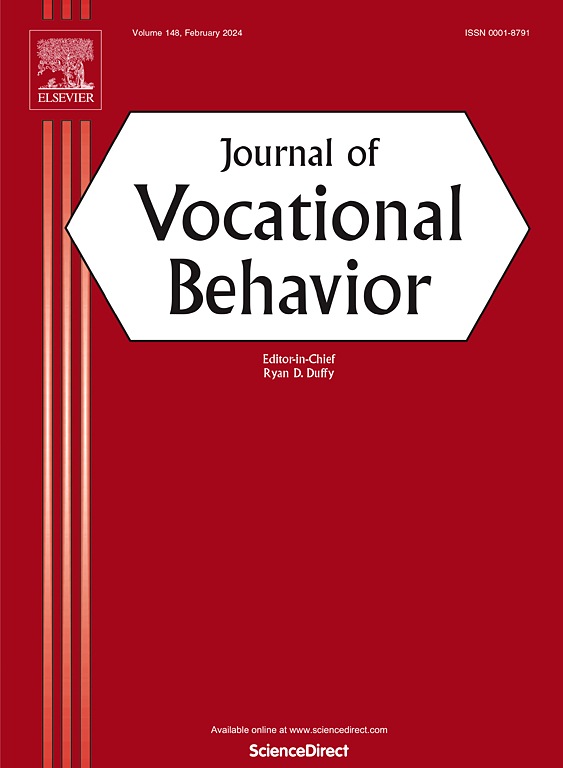在即将接受职业培训的警官中观察到的心理资本轨迹的性质、预测因素和结果
IF 5.2
1区 心理学
Q1 PSYCHOLOGY, APPLIED
引用次数: 0
摘要
本研究旨在以人为中心,动态地了解即将接受职业培训的警察的心理资本轨迹的性质。此外,本研究还试图记录领导-成员交流和感知到的组织支持对这些心理资本轨迹的预测作用,以及这些轨迹对学员态度(即组织犬儒主义、对组织的认同感、对培训项目的参与度和对培训项目的满意度)、心理健康(即感知到的压力)和行为(即在培训项目中的表现)等各种结果的影响。在五个半月的时间里,我们对 1200 名正在接受为期 33 周的全日制警官职业培训的学员进行了四次抽样调查。结果显示,心理资本轨迹与五个主要特征相对应:学会憎恨、高度契合、适度契合、蜜月-宿醉和低度契合。感知到的领导-成员交流和组织支持与这些轨迹相关,这主要符合我们的预期。心理资本水平较低的轨迹与较高的愤世嫉俗和压力水平,以及较低的参与度、认同感、绩效和满意度相关。相反,心理资本水平较高的轨迹则与最积极的结果相关。本文章由计算机程序翻译,如有差异,请以英文原文为准。
Nature, predictors, and outcomes of the psychological capital trajectories observed among upcoming police officers' undergoing vocational training
This study seeks to achieve a dynamic person-centered understanding of the nature of the psychological capital trajectories observed among upcoming police officers undergoing vocational training. Moreover, it seeks to document the predictive role of leader-member exchange and perceived organizational support in relation to these psychological capital trajectories, as well as the implications of these trajectories for a variety of outcomes related to trainees' attitudes (i.e., organizational cynicism, identification with the organization, engagement in the training program, and satisfaction toward the training program), psychological health (i.e., perceived stress), and behaviors (i.e., performance in the training program). A sample of 1200 participants undergoing a 33-week full-time vocational training program to become police officers were surveyed four times over a period of five months and a half. Results revealed that psychological capital trajectories corresponded to five primary profiles: Learning to Hate, High Fit, Moderate Fit, Honeymoon-Hangover, and Low Fit. Perceived leader-member exchange and organizational support were associated with these trajectories in a way that mainly supported our expectations. Trajectories characterized by lower levels of psychological capital were associated with higher levels of cynicism and stress, and with lower levels of engagement, identification, performance, and satisfaction. Conversely, trajectories characterized by higher levels of psychological capital were associated with the most positive outcomes.
求助全文
通过发布文献求助,成功后即可免费获取论文全文。
去求助
来源期刊

Journal of Vocational Behavior
PSYCHOLOGY, APPLIED-
CiteScore
13.10
自引率
5.40%
发文量
85
期刊介绍:
The Journal of Vocational Behavior publishes original empirical and theoretical articles offering unique insights into the realms of career choice, career development, and work adjustment across the lifespan. These contributions are not only valuable for academic exploration but also find applications in counseling and career development programs across diverse sectors such as colleges, universities, business, industry, government, and the military.
The primary focus of the journal centers on individual decision-making regarding work and careers, prioritizing investigations into personal career choices rather than organizational or employer-level variables. Example topics encompass a broad range, from initial career choices (e.g., choice of major, initial work or organization selection, organizational attraction) to the development of a career, work transitions, work-family management, and attitudes within the workplace (such as work commitment, multiple role management, and turnover).
 求助内容:
求助内容: 应助结果提醒方式:
应助结果提醒方式:


